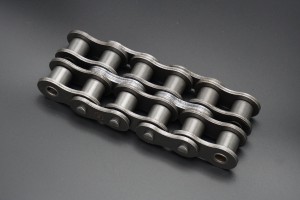The industrial chain is an important part of the smooth operation of various industries, but this link is often ignored. These seemingly simple yet strong connections play a vital role in the functioning of numerous sectors including manufacturing, agriculture, construction and logistics. In this blog, we will delve into the importance of industrial chains and their impact on the overall productivity and efficiency of industrial processes.
Industrial chains are the backbone of many industrial operations and are the primary means of transmitting power and motion within machinery and equipment. These chains are typically made from high-strength materials such as steel and are designed to withstand heavy loads, high temperatures, and harsh environmental conditions. Their durability and reliability make them indispensable in a variety of applications, from conveyor systems in factories to agricultural machinery in the fields.
In manufacturing, industrial chains are used on various types of machinery, including assembly lines, packaging equipment, and material handling systems. They facilitate the smooth, continuous movement of components and products, ensuring that production processes run efficiently and without interruption. Without the reliable performance of the industry chain, the entire manufacturing process will be prone to costly delays and downtime.
In the agricultural field, the industrial chain is used in agricultural machinery such as tractors, combine harvesters, and harvesters. These chains are responsible for transmitting power from the engine to the wheels and other moving parts, allowing for efficient operation of agricultural machinery. In addition, conveyor chains are used in grain handling and processing facilities to facilitate the movement of crops throughout the production and distribution process.
The construction industry also relies heavily on industrial chains for a variety of applications, including lifting and hoisting equipment, as well as heavy machinery for excavation and material handling. The strength and durability of industrial chains are critical to ensuring the safety and efficiency of construction operations, especially in demanding environments such as construction sites and infrastructure projects.
In addition, industrial chains play a vital role in the logistics and transportation fields, where they are used in conveyor systems, material handling equipment, and even propulsion systems for ships and other maritime vessels. The smooth and reliable operation of these chains is crucial for the timely and efficient flow of goods and materials throughout the supply chain, ultimately affecting the overall productivity and cost-effectiveness of logistics operations.
In addition to mechanical applications, the industrial chain contributes to the overall safety and reliability of industrial processes. Properly maintaining and lubricating chains is essential to prevent wear and ensure smooth operation, reducing the risk of equipment failure and potential safety hazards in the workplace.
As the industry continues to develop and the demand for higher efficiency and productivity continues to grow, the role of the industrial chain becomes increasingly important. Manufacturers continue to innovate and develop new chains with enhanced performance characteristics, such as enhanced wear resistance, higher load capacity and improved corrosion resistance, to meet the ever-changing needs of modern industrial applications.
In short, the industrial chain is the unsung hero of industrial operations, providing important connections between power sources and machinery for various industries. Their durability, reliability and versatility make them integral to ensuring that industrial processes run smoothly and efficiently. As the industry continues to advance, the importance of the industrial chain in driving productivity and innovation cannot be overemphasized.
Post time: Apr-12-2024

